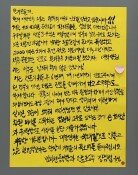Family of Late Samsung Exec. Seeks $4 Mln Indemnity
Family of Late Samsung Exec. Seeks $4 Mln Indemnity
Posted August. 05, 2009 07:33,
The family of a former Samsung Electronics executive killed in a car accident is seeking a record amount of indemnity for his death.
Industry sources yesterday said his family is seeking from Kyobo AXA, the auto insurance company of the vehicle that caused the accident, five billion (4.09 million U.S. dollars) to six billion won (4.91 million dollars) in damages.
The 55-year-old executive was killed in January while heading Samsungs production plant.
The family is basing the claim on what the executive would have earned from Samsung had he continued to work another five years. He earned hundreds of millions of won in annual salary.
A court generally determines the amount of compensation using the Hoffman method, in which the awarded amount is calculated by subtracting expenditures from expected income and considering earnings and age.
The highest premium paid in Korea was 3.51 billion won (2.4 million dollars) in February. The Gwangju District Court ordered the defendant to pay the amount to the bereaved family of a mid-size company owner.
Singer Kang Wol-rae, who was paralyzed in a motorcycle accident in 2003, sought 8.3 billion won (seven million dollars) in damages but settled for 2.1 billion won (1.7 million dollars).
The key element in the latest case is the method for calculating how long Jang would have worked and what he would have earned. The standard retirement age at Samsung is 55, but executives are contract workers whose terms are renewed yearly and not subject to the standard retirement age.
If the court only recognizes his last contract, which was to expire in less than a year, the premium his family will receive will be far smaller.
The family reportedly claimed that Samsung executives generally work until 60, and then are appointed as advisers for another one to three years for large pay even after retirement. If the court accepts the claim, the family can get the amount it seeks.
Another variable is if the court will recognize incentives as salary. Incentives are generally not counted as part of salary, but if an executives pay is highly dependent on performance, the court often allows the inclusion of bonuses.
Samsung since 2000 has paid up to half of its employees annual pay as incentives.
An insurance industry source said, The insurance sector is keeping a close watch on what the court will rule given the lack of specific standards on how to calculate the employment period and income of workers earning executive-level salaries.
weappon@donga.com
Headline News
- Med professors announce intention to leave hospitals starting Thursday
- Bridge honoring Sgt. Moon Jae-sik unveiled in Pennsylvania
- Chief of Staff Chung tells presidential secretaries to stay away from politics
- US FTC bans noncompete agreements
- N. Korea launches cyberattacks on S. Korea's defense companies







